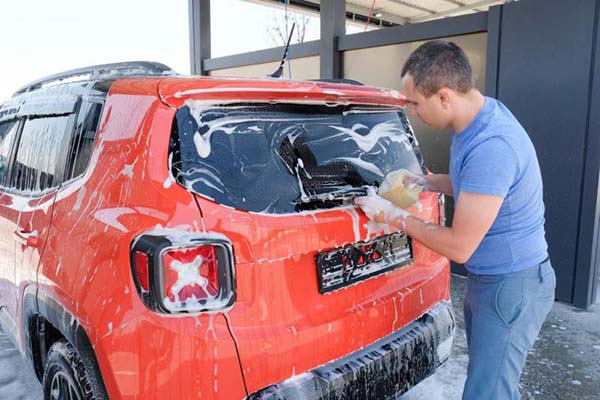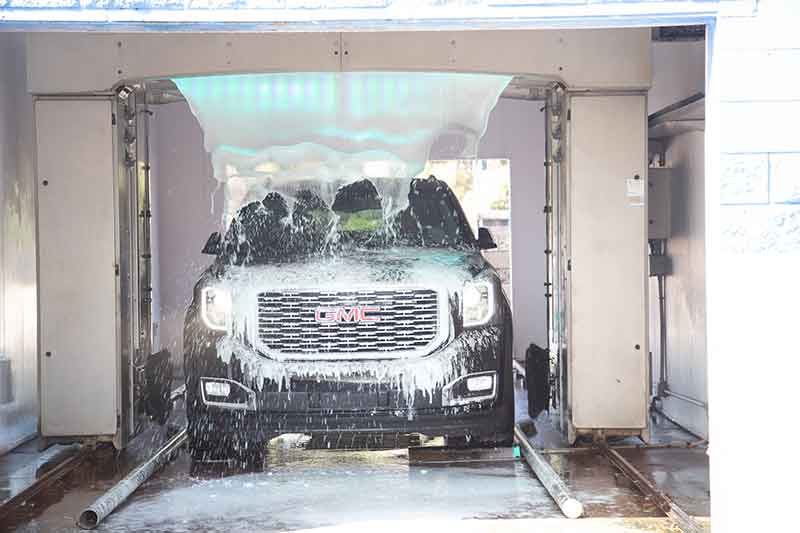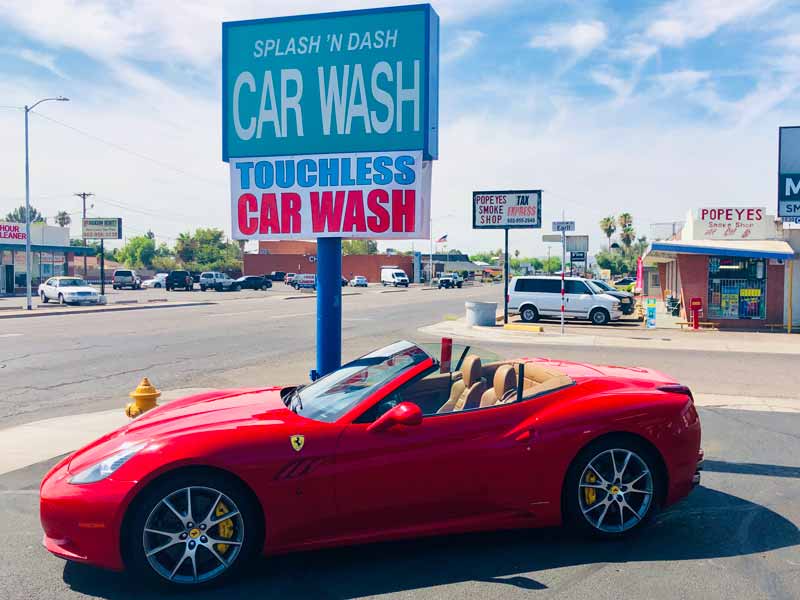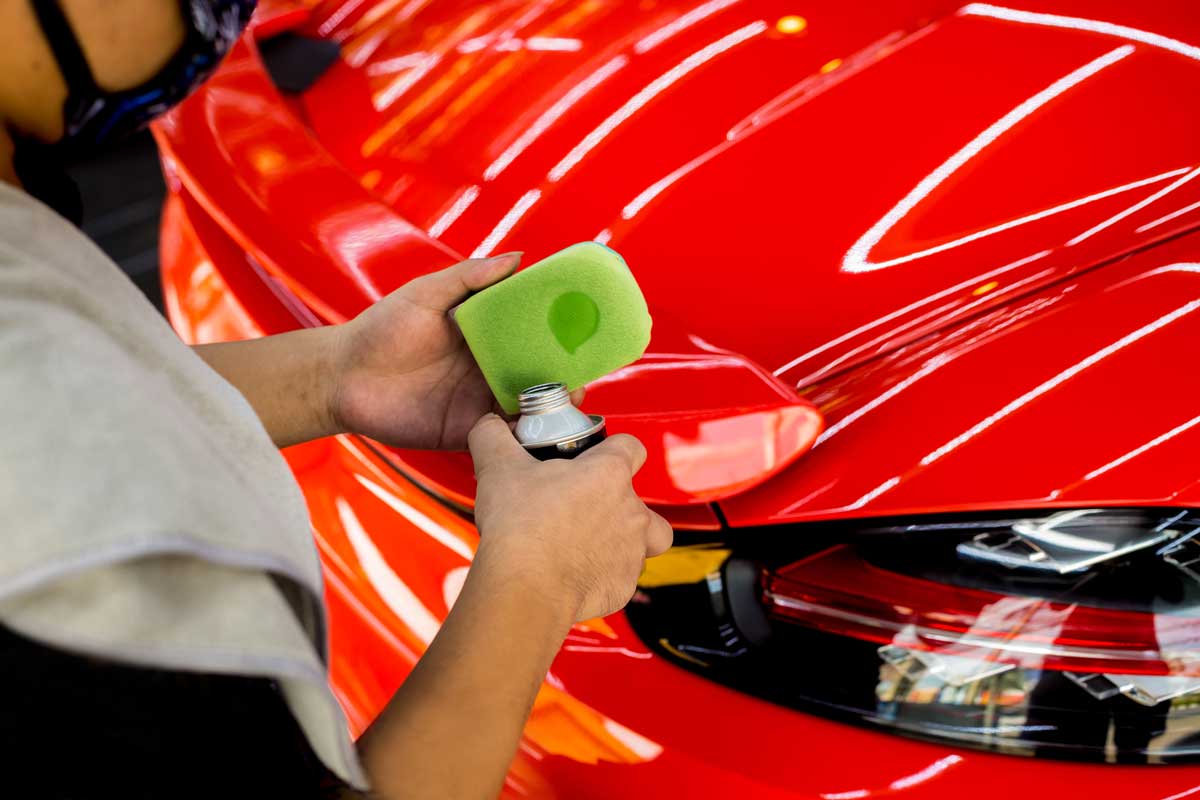Touch-free car wash technology has revolutionized how we maintain our vehicles. It is particularly true in locations like Phoenix, where the heat, dry air, and dust can take a toll on car exteriors.

While owning a vehicle comes with its joys, the upkeep of its appearance can sometimes be a tedious task. Traditional car washing methods can be time-consuming and prone to causing damage, leaving busy car owners frustrated and feeling they may have to cut corners when hand washing to save time.
Let’s explore the transition from manual hand washing (which you may still want to do every so often), automated spinning brushes, and soft cloth washes to the many benefits of touch-free car wash services.
Cons of Hand Washing
Time-Consuming
Hand washing a car at home is a labor-intensive process. It demands a significant investment of time, energy, equipment, and chemicals. The back-and-forth between buckets of water, soap, and scrubbing brushes can turn a relaxing weekend into a chore-filled ordeal.

Washing your car by hand can be a meticulous process. This is especially true for car owners who are particular about preserving their vehicle’s pristine paint finish. The two-bucket car wash method is a popular technique among enthusiasts aiming to minimize swirls and scratches on the paint surface. The first bucket contains soapy water for washing. The second is filled with clean water to rinse the wash mitt and prevent dirt transfer. One should also be sure to have “grit-guards” in the bottom of each bucket. That way, dirt sinks down below the elevated grate that it creates and the sponge is not picking the dirt back up. That dirt can accidentally scratch the vehicle.
This process requires careful attention to detail, as each step is crucial to achieving a great result. Starting with a thorough pre-rinse to remove loose dirt. The car owner then meticulously washes and then dries the vehicle panel by panel. They must ensure that the wash mitt is regularly rinsed in the clean water bucket to prevent contaminants from being reintroduced. While this method may yield a showroom-quality shine, the meticulous nature of the process can be time-consuming. This is a hassle for those who value their car’s appearance and want to maintain its impeccable finish.
Cons of Automatic Spinning Brush Washes
Paint and Finish Damage
Though efficient, automatic car washes often come with the unintended side effect of paint damage, swirl marks, and scratches. While effective at dislodging dirt, the brushes can inadvertently harm a vehicle’s delicate paint finish, leaving unsightly blemishes.
Risk to Body Trims
Whether manual or automated, traditional car washes can pose a risk to exterior body trims, such as side mirrors, antennas, and spoilers. These vulnerable parts can easily be caught by spinning brushes, leading to breakage or malfunctions.
Cons of Soft-Touch Car Washes
Soft-touch car washes, also known as friction-based or cloth-based car washes, utilize rotating cloth strips and brushes to clean vehicles. Despite their popularity, these systems also come with inherent risks of which car owners must be aware.
Potential for Paint Damage
Although designed to be gentle, the rotating cloth strips can still cause unintended paint damage. These “noodle” strips can become saturated with dirt, grime, and chemicals if not properly cleaned and maintained. This can lead to scratches and swirl marks on the vehicle’s surface.
Limited Effectiveness for Tough Grime
While a soft-touch car wash is generally adequate for routine cleaning, it might struggle to tackle stubborn grime or contaminants.
Risk to Body Trims

Soft-touch washes can be problematic for vehicles with loose parts or accessories. The moving cloth strips might catch onto the antenna, spoilers, or other protruding elements, potentially causing breakage or dislodgment.
Rocker Panel Neglect
The design of soft-touch wash systems might lead to neglecting certain areas of the vehicle, such as rocker panels. These hard-to-reach areas can be challenging for the cloth strips to clean effectively. This can result in uneven cleanliness and potentially contributing to the buildup of dirt and debris over time.
Opting for Excellence: The Touch-Free Advantage
The advent of touch-free car wash technology has been a game-changer in the automotive industry. Touch-free washes, high-pressure water jets, advanced detergents, and precise nozzle positioning achieve a thorough cleaning without physical contact. This technology addresses the cons of hand washing, soft cloth, and brush-based automatic washes while offering a range of unparalleled benefits.
Gentle Yet Thorough Cleaning
Other car wash methods may struggle with hard-to-reach spots, but touch-free car washes shine in this regard. With precise nozzle positioning and powerful water jets, they can effectively target every nook and cranny of a vehicle. This ensures a thorough clean even in the most challenging areas like rocker panels and intricate body contours.
Paint Protection
Touch-free car washes eliminate the risk of swirl marks and paint damage often accompanying other types of washes. By relying on water pressure and specialized cleaning agents, the touch-free process preserves the integrity of the vehicle’s paint. This enhances its aesthetic appeal and resale value.
Safety for Body Trims
The absence of physical brushes in touch-free car wash systems eliminates the risk of damage to delicate body trims and accessories. Car owners can rest assured that their vehicle’s exterior features will remain intact and fully functional.
Automated Convenience
Touch-free car washes offer unparalleled convenience with fully automated systems that require minimal human intervention. In Phoenix, the sun’s intensity can make hand washing an unbearable task. A touch-free car wash facilities offer a hassle-free solution that saves time and effort.
Eco-Friendly Approach
Touch-free car washes are generally more environmentally friendly compared to traditional washing methods. These systems tend to use less water due to their precise targeting of dirt and grime, and some facilities even employ water recycling systems to minimize water wastage.
Conclusion
The evolution of car washing technology from hand washing to brush-based automatic systems and, eventually, to touch-free car washes has transformed how we care for our vehicles. The benefits of touch-free car wash facilities are particularly pronounced in Phoenix, a city known for its scorching heat and active lifestyles.
As the automotive industry continues to advance, embracing innovative solutions like touch-free car washes simplifies car maintenance and contributes to preserving the long-term value and appeal of our cherished vehicles. In a world where convenience, efficiency, and sustainability are paramount, touch-free car washes are a shining example of how technology can enhance everyday experiences and solve age-old challenges.

At Anytime Touchless Car Wash, the gentle yet effective cleaning process, coupled with the convenience of 24/7 accessibility and additional amenities like vacuum stations and vending machines, makes a touch-free car wash a compelling choice to keep your vehicle in tip-top shape.
FAQ’s
What’s the difference between soft touch and touch-free car washes?
Soft-touch car washes use rotating cloth strips and brushes, while touch-free car washes employ high-pressure water jets and advanced detergents, avoiding physical contact with the vehicle.
Is a touch-free car wash better than a hand wash?
Generally, touch-free car washes are better than hand washing because they provide thorough cleaning without the risk of scratches, swirl marks, or improper techniques.
How can I wash my car without touching it?
You can wash your car without touching it by opting for a touch-free car wash that uses high-pressure water jets and specialized cleaning agents to clean the vehicle’s surface without physical contact.
What are the advantages of a touch-free car wash?
Touch-free car washes offer benefits such as gentle cleaning without paint damage, effective removal of dirt, and avoidance of scratches and swirl marks.





